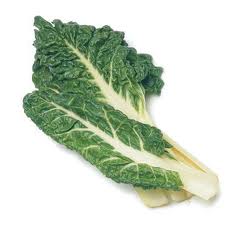 Swiss chard, a leafy vegetable with Mediterranean origins, is prized for its taste and nutritional value. With red, yellow and white varieties, you are sure to impress your guests in terms of taste and appearance when using Swiss chard. Chard grows wild throughout the Mediterranean, and is exceptionally popular in Provence, where chefs from Nice to Marseille add it to soup, rice and fish. A hearty vegetable which can withstand cold temperatures, Swiss chard can be harvested up until the first frost of the winter. Swiss chard is full of vitamin A, making it an ideal addition to your diet.
Swiss chard, a leafy vegetable with Mediterranean origins, is prized for its taste and nutritional value. With red, yellow and white varieties, you are sure to impress your guests in terms of taste and appearance when using Swiss chard. Chard grows wild throughout the Mediterranean, and is exceptionally popular in Provence, where chefs from Nice to Marseille add it to soup, rice and fish. A hearty vegetable which can withstand cold temperatures, Swiss chard can be harvested up until the first frost of the winter. Swiss chard is full of vitamin A, making it an ideal addition to your diet.
Key Nutrients
Swiss Chard is packed with vitamins C, A, K, E as well as carotenes, fiber and chlorophyll. Swiss chard is also packed with many minerals such as potassium, iron, calcium, zinc and selenium.
Health Benefits
Vitamin A – Vitamin A, when converted into retinaldehyde, is a vital compound for healthy eyes. Furthermore, vitamin A is believed to fight against cataracts, macular degeneration and glaucoma. Vitamin A strengthens the membranes of the human body such as mucous membranes, respiratory, urinary and intestinal tracts. It is also essential for the lymphocytes, or white blood cells, that fight infection once in the body.
Vitamin C – Regular consumption of foods rich in vitamin C helps the body develop resistance against infections and scavenges harmful, pro-inflammatory free radicals. Vitamin C also helps to prevent respiratory problems such as asthma and lung cancer. Vitamin C has been shown to lower blood pressure, and therefore lessen the probability of hypertension.
Vitamin K – Vitamin-K plays an important role in bone metabolism by promoting osteotrophic activity in bone cells. Vitamin K also acts to clot open wounds and prevent excessive bleeding. Healthy vitamin K levels lower the release of the glycoprotein interleukin-6, a marker of inflammation within the body.
Vitamin E – Research has shown that vitamin E possesses anti-inflammatory effects that can combat arthritis, rheumatism, asthma, and other inflammatory disorders linked to chronic inflammation. Vitamin E also improves the body’s metabolic function.
Dietary Fiber – Dietary Fiber stimulates digestion and peristalsis, helping to relieve indigestion and constipation problems.
Beta Carotene – Beta carotene has been well-studied as a dietary antioxidant. Carotenoids are also thought to benefit eye health. Some studies support a role of carotenoids in reducing macular degeneration.
Potassium – Potassium is an essential mineral which aids in fluid regulation, protein synthesis and cardiovascular health. High levels of potassium are associated with reduced risk for stroke, improved blood pressure control as well as bone health.
Iron –Iron, found in red blood cells, is an integral part of hemoglobin. Hemoglobin carries oxygen from the lungs to the cells. Iron is an essential component of many enzymes necessary for various chemical reactions in the body.
Calcium – Calcium is an important mineral for bone and teeth growth and maintenance. It is also an important mineral in terms of cardiovascular function.
Zinc – The health benefits of Zinc include proper functioning of immune system, digestion, control of blood sugar and energy metabolism.
Season
Swiss Chard grows throughout the spring and summer, making this leafy vegetable available in the late spring, throughout the summer and into the fall.
Nutrition Information
Per 1 Cup (33 grams):
Calories (cKal): 33
Protein (grams): .65
Total Fat (grams): .1
Carbohydrates (grams): 1.8
Fiber (grams): .8
Buying and Storing
When buying Swiss chard, make sure the leaves are crisp, dark green and have a wax-like appearance. Leafs with a large amount of holes should be avoided, since this tends to indicate a large amount of insect damage. When at home, store Swiss chard in your refrigerator for up to five days. Make sure store your chard in a plastic bag to keep it moist and fresh.
Best Way to Add to Diet
When cooking with chard, make sure to remove and discard the tougher ends of the stalk. Wash under cold water for at least 30 seconds. Swiss chard can be enjoyed steamed or sautéed. Make sure to not overcook the chard, since this can deplete its nutrition content.
Swiss Chard Recipe
Soup of Swiss Chard and White Beans

 Not Sure What Healthy Foods To Eat?
Not Sure What Healthy Foods To Eat? This week we take a look at one of my favorite healthy foods...the mighty Avocado.
This week we take a look at one of my favorite healthy foods...the mighty Avocado.
No comments yet.